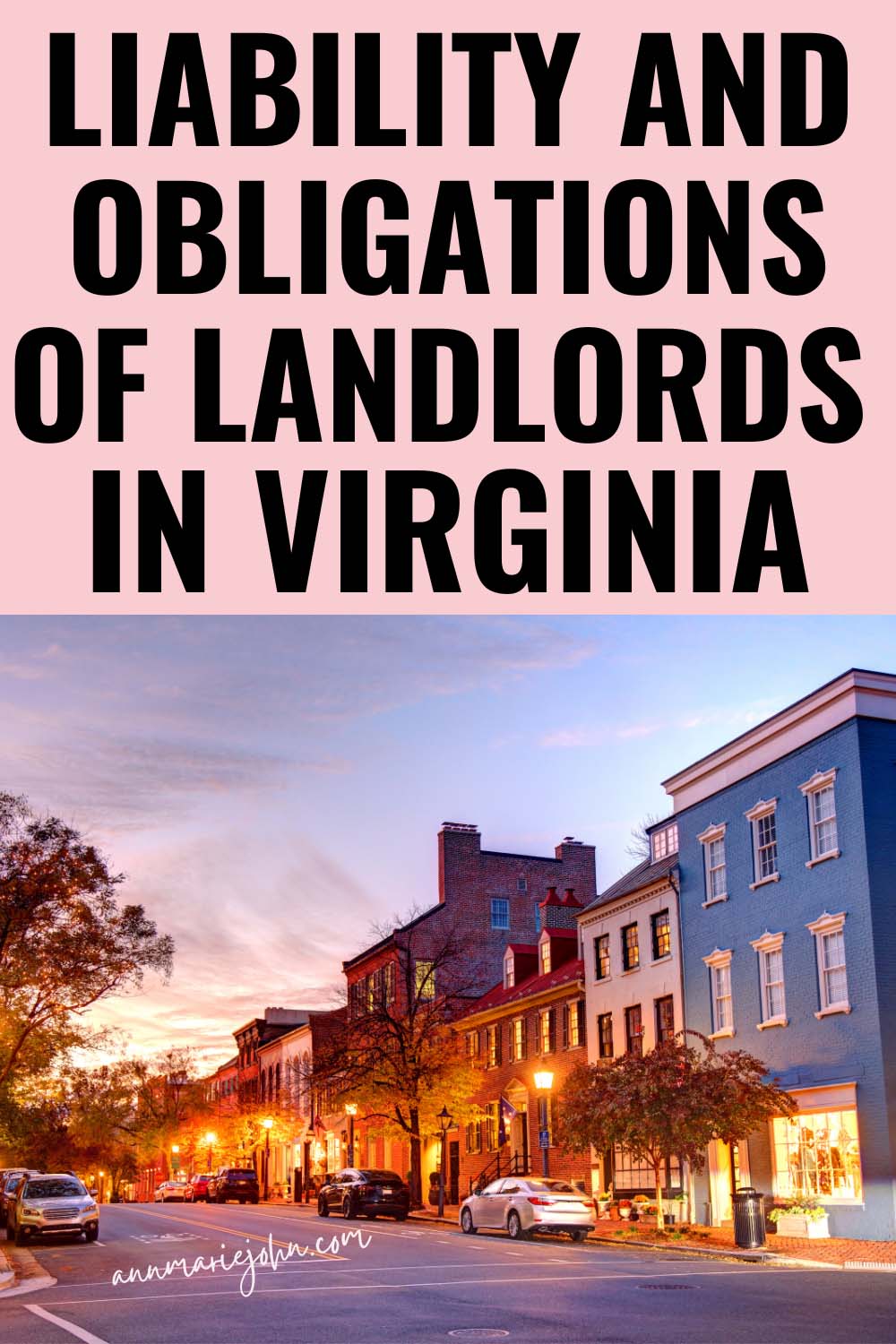New to the landlord business? Find out what legal liabilities you face as a landlord renting in Virginia, including rules on maintenance requirements, mold issues, tenant rights, and more.

To be a successful landlord, you must comply with applicable regulations and all federal, state, and local laws. This can be a difficult task, even for experienced people. However, failure to comply can result in fines, the loss of a driver’s license, or expensive lawsuits. Realtors in Virginia Beach emphasize that it’s the primary responsibility of landlords in Virginia to comply with rental property requirements.

Virginia real estate rentals, compliance
No matter where your investment property is located, there are important rules and laws that all property owners must follow. This ensures that tenants and landlords are protected from unsafe or fraudulent rental practices. So below, let’s take a look at what it takes for a qualified landlord to rent a property in Virginia.
Current rental laws in Virginia
In Virginia, two important statutes govern the rights and responsibilities of landlords and tenants. In addition, landlords must adhere to strict fair housing rules, regardless of where they are located. See an overview of relevant Virginia laws below.
- The Virginia Residential Landlord and Tenant Act apply to landlords who rent out two or more apartments. This law describes the most important definitions, guidelines, and rules for rental businesses.
- The Virginia Uniform Building Code applies to all rental housing in the state of Virginia. National building codes establish standards for the construction, repair, or reconstruction of any property, including rented property.
- The Fair Housing Act protects tenants across the country from discrimination. In Virginia, landlords must rent without regard to race, color, religion, national origin, sex, marital status, disability, financial source, orientation, gender, or veteran status. A standard list of fair housing requirements that meet the requirements must be developed and consistently followed by all tenants.
- In many jurisdictions, rental property owners must obtain a rental license before accepting tenants in their investment properties. However, rental properties are considered a different type of small business in Virginia. Therefore, landlords must obtain a basic business license before renting out housing to tenants.
Legal notices in Virginia
In addition to the important information listed above, Virginia landlords are required to provide additional information as part of their lease. Failure to comply with any of these elements can result in large fines or lawsuits. Therefore, always read the requirements carefully and make sure that your lease and rental agreements are fully compatible. You can do this by contacting real estate agents in Virginia who will help you with this matter. See all important nuances and explanations.
- Presence of mold – landlords must disclose all information about the presence of mold in the rental property.
- Bad drywall – If the property has defective drywall, the landlord must notify the tenant.
- Lead-Based Paint – For homes built before 1978, homeowners must provide EPA-approved information on lead levels and potential contamination.
- Authorized Representative – Enter the appropriate contact information for the party that owns or manages the property.
- Locations near military installations – Landlords must notify tenants if their rental property is located near noisy areas such as military bases.
- Manufacture of methamphetamine – If the landlord knows that the property has previously been used for the manufacture of methamphetamine, this must be disclosed.
In addition to the compatibility of leases described above, landlords in Virginia have many other important obligations that they must carefully comply with. What you expect from your tenants, they expect from you. However, please read below some of the landlord’s responsibilities regarding rental property and tenant relations:
- Guarantee of the suitability of the property for habitation;
- Security of tenants and the community;
- Internal repairs carried out at an appropriate level;
- Follow government rental guidelines;
- Follow the procedures for legal termination of the lease and eviction;
Tenants deserve a safe and comfortable place to live in their rental property. However, landlords have a legal obligation to keep their rental property in a habitable condition. In Virginia, this is called an “implied guarantee of permanent residence.” Some of these obligations include, but are not limited to:
- Preserve the structural integrity of your home;
- Quick response to repair problems;
- Make sure the heating, electricity, and hot and cold water systems are working properly;
- Take an active part in ensuring a pest-free habitat;
- Comply with all state and local building codes, inspections, or regulations;
- Provide safe living conditions.
A safe and livable property is important to tenants, but so is keeping your rental property in excellent condition. Also, if you don’t take care of your Virginia rental property, tenants have the option of reducing their rent.
Security of tenants during the rental period
All residents should feel safe in their new apartments. For homeowners, this starts with making sure the locks on their homes are intact and working properly. If your budget allows, consider adding a security system, a video doorbell, and motion-activated lighting for added security. In addition to protecting new residents, there is also an obligation to one’s neighbors in the community.
All landlords are responsible for screening all tenants thoroughly when they apply. The scan usually includes proof of income, rental history, credit scores, and all necessary reference checks. But another important factor is a criminal record. These reports help homeowners identify relevant crimes that could put them, their property, or their neighbors’ property at risk.
The Fair Housing Act does not currently cover criminal records. Instead, the US Department of Housing and Urban Development advises landlords to consider the seriousness and nature of the crime, as well as the length of time since the crime was committed, when deciding whether to rent a property to specific people.
Internal repair and sensitivity
Repairs are inevitable in the rental business. It’s not just about keeping tenants happy; it’s about preserving the value of your investment property. Failure to make timely repairs can lead to greater and more expensive damage. But the results do not end there. If the landlord does not make the necessary repairs and the house becomes uninhabitable, the tenants may not pay the stipulated rent.
In some jurisdictions, tenants may authorize a third party to deduct the cost of repairs from the rent. Therefore, to avoid disputes, a quick reaction and quick action are necessary. A typical response time is 24 hours, however, 48 hours is acceptable except for minor maintenance.
In any case, communication with tenants is extremely important. Respond as soon as possible, acknowledge their concerns, and let them know what steps you have taken to resolve the issue. This way, your tenants will know that you are working on the renovation and care about their comfort, even if, for some reason, it takes a little longer.
Follow government rental and deposit guidelines
Each state has its own rules regarding deposit limits, rent increases, and rent collection. As a landlord, it is your responsibility to ensure that the policies in your tenancy agreement comply with these current regulations. Let’s look at some examples of these Virginia laws – to break a non-paying lease, the landlord must give the tenant 5 days to pay or they must move out. If you do not comply, the landlord may ask you to move out.
Virginia limits the security deposit to two months’ rent. After the tenant moves out, the landlord must return all or part of the deposit to the tenant within 45 days. A written and detailed list of collateral must be prepared and sent to the tenant in advance.
Follow the procedures for legal termination of the lease and eviction. But in the event of an eviction, they must strictly follow the procedures set by the state. It is also important to know why the landlord wants to terminate the lease with the tenant. For example, in Virginia, landlords can immediately evict tenants who violate the terms of their lease by engaging in criminal activity.
In addition, certain reporting requirements must be met to successfully evict tenants. The eviction process can take time, but every step of the legal process is extremely important. Owners should never try to take matters into their own hands. Never try to retaliate against or evict a tenant unless it is a legal eviction for filing a legal complaint against the tenant. In this way, you will be fully compliant with the Landlord and Tenant Act.
In Conclusion
The availability of a rental property, regardless of location, is a difficult issue for landlords. Ultimately, not following the rules can lead to large fines, lawsuits, and more trouble. Fortunately, following the law is a guaranteed way to avoid these problems. There are simple ways to get the most out of your investment. This can be done by hiring a local Virginia real estate agent who has all the experience needed to guide landlords through all stages of the rental property process, from initial inspection to ongoing maintenance, marketing, leasing, and financial reporting. Call a qualified real estate agent today to learn more about the benefits of rental property management.
